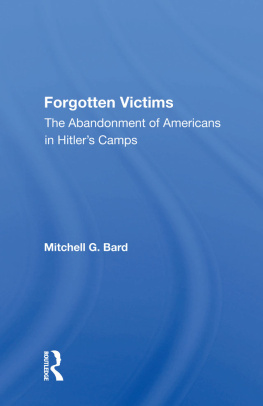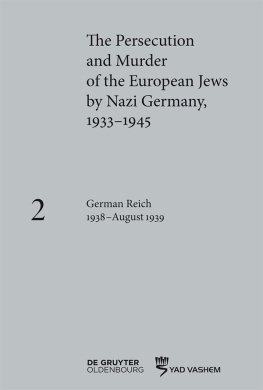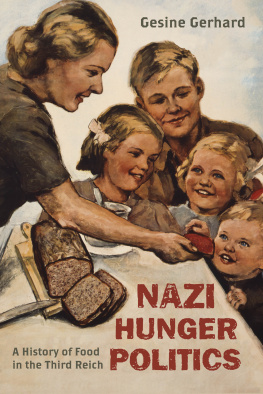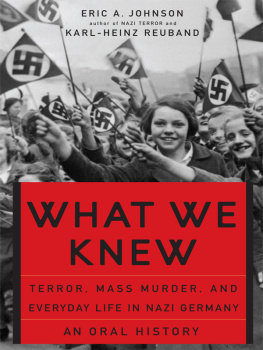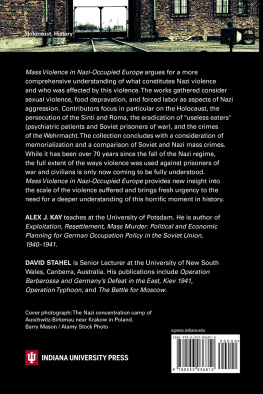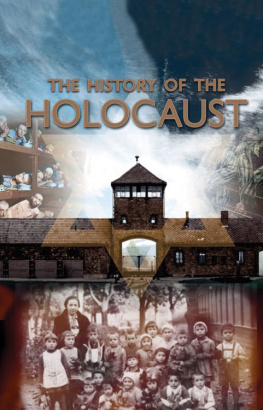EMPIRE OF DESTRUCTION

Copyright 2021 Alex J. Kay
All rights reserved. This book may not be reproduced in whole or in part, in any form (beyond that copying permitted by Sections 107 and 108 of the U.S. Copyright Law and except by reviewers for the public press) without written permission from the publishers.
For information about this and other Yale University Press publications, please contact:
U.S. Office:
Europe Office:
Set in Minion Pro by IDSUK (DataConnection) Ltd
Printed in Great Britain by TJ Books, Padstow, Cornwall
Library of Congress Control Number: 2021936886
e-ISBN 978-0-300-26253-1
A catalogue record for this book is available from the British Library.
10 9 8 7 6 5 4 3 2 1
For Valentina and Cyrus
Everybody keeps on shouting Where was God? I kept on saying Where was man?
Josef Perl, Holocaust survivor
And even if some proof should remain and some of you survive, people will say that the events you describe are too monstrous to be believed.
Primo Levi, quoting an SS guard at Auschwitz
CONTENTS
ILLUSTRATIONS
.
ABBREVIATIONS
AB | Auerordentliche Befriedungsaktion (Extraordinary Pacification Operation) |
BArch | Bundesarchiv ([German] Federal Archives) |
BArch-MA | Bundesarchiv-Militrarchiv ([German] Federal Military Archives) |
BdS | Befehlshaber der Sicherheitspolizei und des SD (senior commander/s of the Security Police and the SD) |
BLSA | British Library Sound Archive |
Dulag | Durchgangslager (transit camp) |
EK | Einsatzkommando (operational commando) |
EM | Ereignismeldung (Incident Report) |
Gestapo | Geheime Staatspolizei (Secret State Police) |
Gulag | Glavnoe Upravlenie Lagerei ([Soviet] Main Directorate of Camps) |
HLSL | Harvard Law School Library |
HSSPF | Hhere/r SS- und Polizeifhrer (higher SS and police leader/s) |
IMG | Internationaler Militrgerichtshof (International Military Tribunal) |
KdS | Kommandeur/e der Sicherheitspolizei und des SD (commander/s of the Security Police and the SD) |
OKH | Oberkommando des Heeres (High Command of the [German] Army) |
OKW | Oberkommando der Wehrmacht (High Command of the Wehrmacht) |
Nbg. Doc. | Nuremberg Document |
NCO | non-commissioned officer |
NHCM | National Holocaust Centre and Museum, Laxton |
NKVD | Narodnyy Komissariat Vnutrennikh Del ([Soviet] Peoples Commissariat for Internal Affairs) |
POW | prisoner of war |
RSHA | Reichssicherheitshauptamt (Reich Security Main Office) |
SD | Sicherheitsdienst (Security Service [of the SS]) |
Sipo | Sicherheitspolizei (Security Police) |
SK | Sonderkommando (special commando) |
SS | Schutzstaffel (protective echelon) |
Stalag | Stammlager (regular POW camp for enlisted men) |
USHMM | United States Holocaust Memorial Museum |
Wi F Stab Ost | Wirtschaftsfhrungsstab Ost (Economic Command Staff East) |
Wi R Amt | Wehrwirtschafts- und Rstungsamt (War Economy and Armaments Office [in the OKW]) |
Wi Stab Ost | Wirtschaftsstab Ost (Economic Staff East) |
WVHA | Wirtschafts-Verwaltungshauptamt (Economic Administration Main Office [of the SS]) |
YVA | Yad Vashem Archives |
z.b.V. | zur besonderen Verwendung (for special assignment) |
NOTE ON PLACE NAMES AND CONVENTIONS
In order to ensure some uniformity in the use of place names in this book, I have adopted the name in use at the time of the respective German invasion. For example, for those Polish places whose names were changed during the German occupation from 1939 onwards, I have opted to use the Polish name, with the German name in parentheses at the first mention, thus Czstochowa (Tschenstochau), Dziekanka (Tiegenhof) and so on, and thereafter the Polish name only. Exceptions to this are Danzig (as the Free City of Danzig between 1920 and 1939), Cracow (as the commonly used English name) and camp names such as Auschwitz, Birkenau or Monowitz (as referring to the camp, not the place). By the same token, places that were part of Germany during the period in question until passing to Poland in 1945 are referred to by their German name, with the Polish name in parentheses at the first mention, for instance Breslau (now Wrocaw). As Lithuania, Latvia, Estonia, Belarus and Ukraine belonged to the Soviet Union during the events in question, I have employed the Russian form of all Soviet place names, thus Lvov (not Lviv or Polish Lww), Rovno (not Rivne), Kharkov (not Kharkiv) and so on. The Soviet administrative units oblast and raion are translated throughout as province and district, respectively. I refer to the occupied Polish territories not annexed to the German Reich using the contemporary translation Government General rather than General Government, which is more common in todays secondary literature.
As use of the terms Nazi and Nazis was already widespread in both English and German during the period covered by this book, they will also be used here, where applicable. Throughout the text, most German military and paramilitary ranks are referred to by their British army equivalents. Where there was no equivalent, they are translated into English (see Appendix II: Comparative Ranks for 1942). In an effort to make the prose as
ACKNOWLEDGEMENTS
Books tend to be collaborative efforts, even when there is only a single author, and this one is no exception. A number of friends and colleagues kindly read one or more draft chapters at various stages of the writing process and made helpful suggestions for improvements: Paul Bartrop, Jochen Bhler, Robert Gerwarth, Gerrit Hohendorf, Martin Holler, Juliane Krause, Martijn Lak, Stephan Lehnstaedt, Peter Lieb, Darren OByrne, Reinhard Otto, Henning Pieper, Jeff Rutherford, Ben Shepherd, Christian Streit, Clemens Uhlig and Ulrike Winkler. I am grateful to all of them for giving their time and expertise. Nicholas Terry displayed a rare generosity by reading the entire draft manuscript and providing extensive feedback on the basis of his considerable knowledge of the relevant scholarship and historiographical debates in multiple languages. I am deeply indebted to him. My thanks also go to the two anonymous referees for their detailed and constructive feedback, and to David Stahel, Rolf Keller, Tal Bruttmann and Oleg Beyda for their help with images. I am obliged to the German Historical Institute in Moscow and the Holocaust Memorial Centre in Budapest for their invitations to present on themes covered in the book at conferences in September and November 2020, respectively.
Next page

